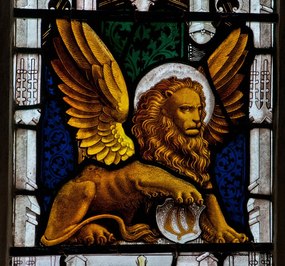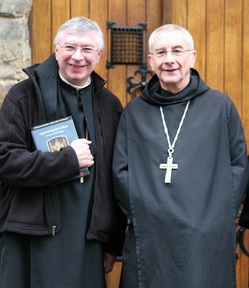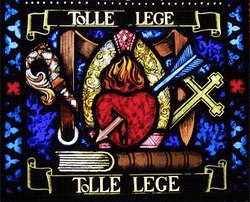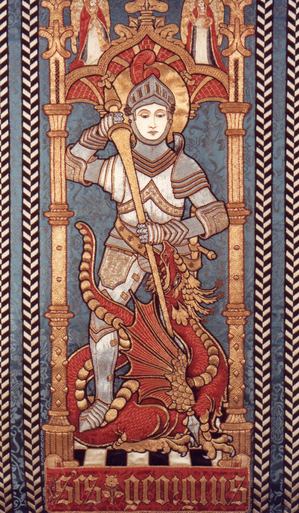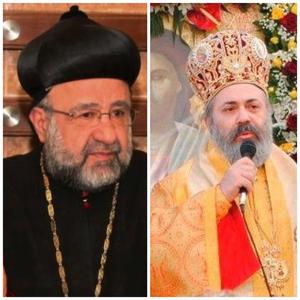‘The Maastricht Hours’, Liège 14th century (British Library, Stowe 17, fol. 172r)
Saint Mark
We know Jesus Christ through the mediation of others and if fortunate, to a personal relationship. On the former, we honor today the author of the first of the gospels. Saint Mark’s testimony to who Jesus is, and what he means to God’s promise to be with us.
The meditation today brings us to guidance we share in for our salvation.
“… the words of our Risen Jesus forbid us to fear such a calamity. He did not say to his Apostles: “Lo! I am with you even to the end of your lives;” but Lo! I am with you all days, even to the consummation of the world. So that those to whom he addressed himself were to live to the end of the world! What means this, but that the Apostles were to have successors, in whom their rights were to be perpetuated, successors whom Jesus would ever assist by his presence and uphold by his power? The work founded by a God, out of his love for man, and at the price of his own precious Blood, must surely be imperishable! Jesus, by his presence amidst his Apostles, preserved their teaching from all error; by his presence he will also, and forever, guide the teaching of their successors.”
The Liturgical Year
Dom Proper Guéranger, OSB
The Ear of the Heart by Mother Dolores Hart
Praying for the abbot in the Eucharistic Prayer at Mass?
Frequently do I go to places where certain liturgical practices catch my attention because of the novelty of what is said and heard. We always need a deeper understanding, a profound appreciation for the prayer of the Church as expressed in the sacred Liturgy. Some will say that canon law, particularly liturgical law, is the bad side of the Good News. As Catholics we are part of a Church; as Catholics we are not independent of sacred Scripture, sacred Tradition and the sacred Magisterium; as Catholics we follow a guided companionship on a journey to a deeper communio with the Triune God. We are not Marlboro people; we are, in fact, sheep in flock called to the Holy Synaxis, to the holy in-gathering of a people in Christ, or simply, Church. We have a good shepherd in Jesus and in His successors, that is, the bishops, and we follow the teaching authority of the Christ and His vicars.
This is a long introduction to a question as whether or not priests of monastic communities ought to name the abbot in the Eucharistic Prayer. There seems to be some confusion over this seemingly small, trite matter. It is not small, and it is not trite. We have an ecclesiology, and we have a liturgical practice that ought to be followed because we live our Catholic lives in communion with others. Abbots are minor prelates; they exercise their pastoral authority and power in their monastic community and not in a diocese, and by extension to the dependent priories. An abbot ought not employ the attitude of having a mitre and a crosier so that you can do whatever you’d like, whenever you’d like, etc.
Can a priest commemorate Abbot X (or even the abbess if in the context of a woman’s monastery) along with the pope and the bishop in the Eucharistic Prayer at Mass?
The General Instruction of the Roman Missal gives four titles that may be named in the Eucharistic Prayer: “The Diocesan Bishop, or one who is equivalent to the Diocesan Bishop in law, must be mentioned by means of this formula: together with your servant N., our Pope, and N., our Bishop (or Vicar, Prelate, Prefect, Abbot)” (no. 149). Each of these offices are “equivalent to the Diocesan Bishop in law” by virtue of their appointment to act on behalf of the Supreme Pontiff within a particular area.
Continue reading Praying for the abbot in the Eucharistic Prayer at Mass?
Remembering Saint Augustine’s conversion
You may remember reading this phrase in the Confessions, “Tolle lege.” It means “take up and read.” As is well known that “while he was under conviction of sin, Augustine heard some children singing this phrase as they played — and he concluded that God was telling him to “take up and read” the Scriptures. And the rest is history…
The practice of Lectio Divina is essential for knowing the beauty of the faith.
Today, the Norbertine liturgical calendar celebrates the conversion of Saint Augustine, Bishop of Hippo, and their holy patron. Let’s pray for the canons of Daylesford Abbey.
Pope Francis: cannot believe in Jesus without the Church
In the Pauline Chapel in Apostolic Palace, Pope Francis offered Mass with some of the cardinals on the feast of Saint George, the name day of the Pope, Saint George. There are several stellar points made the Pope noted below with my emphasis. In these days when one’s identity as a Christian is questioned, or even rejected for superficial reasons, I think that if you consider what the Church teaches, especially through the eyes of Pope Benedict and now through Pope Francis, you will notice the truth, not ideology, joy, not grumpiness. The Pope uses another previous pope to help him and us to understand the work of the Church –her mission– under the power of the Holy Spirit.
The [first] reading today makes me think that the missionary expansion of the Church began precisely at a time of persecution, and these Christians went as far as Phoenicia, Cyprus and Antioch, and proclaimed the Word. They had this apostolic fervor within them, and that is how the faith spread! Some, people of Cyprus and Cyrene – not these, but others who had become Christians – went to Antioch and began to speak to the Greeks too. It was a further step. And this is how the Church moved forward. Whose was this initiative to speak to the Greeks? This was not clear to anyone but the Jews. But … it was the Holy Spirit, the One who prompted them ever forward … But some in Jerusalem, when they heard this, became ‘nervous and sent Barnabas on an “apostolic visitation”: perhaps, with a little sense of humor we could say that this was the theological beginning of the Doctrine of the Faith: this apostolic visit by Barnabas. He saw, and he saw that things were going well.
And so the Church was a Mother, the Mother of more children, of many children. It became more and more of a Mother. A Mother who gives us the faith, a Mother who gives us an identity. But the Christian identity is not an identity card: Christian identity is belonging to the Church, because all of these belonged to the Church, the Mother Church. Because it is not possible to find Jesus outside the Church. The great Paul VI said: “Wanting to live with Jesus without the Church, following Jesus outside of the Church, loving Jesus without the Church is an absurd dichotomy.” And the Mother Church that gives us Jesus gives us our identity that is not only a seal, it is a belonging. Identity means belonging. This belonging to the Church is beautiful.
Continue reading Pope Francis: cannot believe in Jesus without the Church
St. George and The Dragon
Let us pray for the Roman Pontiff whose baptismal name is George, and for all those who claim the saint has their heavenly patron before God Almighty.
St. George and The Dragon
Of Hector’s deeds did Homer sing,
And of the sack of stately Troy,
What griefs fair Helena did bring,
Which was Sir Paris’ only joy:
And by my pen I will recite
St. George’s deeds, and English knight.
Against the Sarazens so rude
Fought he full long and many a day,
Where many gyants he subdu’d,
In honour of the Christian way;
And after many adventures past,
To Egypt land he came at last.
Now, as the story plain doth tell,
Within that countrey there did rest
A dreadful dragon fierce and fell,
Whereby they were full sore opprest:
Who by his poisonous breath each day
Did many of the city slay.
The grief whereof did grow so great
Throughout the limits of the land,
That they their wise-men did intreat
To shew their cunning out of hand;
What way they might this fiend destroy,
That did the countrey thus annoy.
The wise-men all before the king,
This answer fram’d incontinent:
The dragon none to death might bring
By any means they could invent;
His skin more hard than brass was found,
That sword nor spear could pierce nor wound.
John Paul could be canonized in 2013
Having died in 2005, beatified on 1 May 2011, John Paul II may well be a saint later in 2013. Some are speculating that he may be canonized in October. A group medical professionals have recognized miracle of healing at Blessed John Paul’s intercession as inexplicable.
Now the presumed miracle needs the approval of the theologians and then approval of the cardinals and bishops of the Congregation of Saints before the dossier is presented to Pope Francis’ fiat. If all goes well, John Paul would be one of very few fast-tracked saints in the modern era: only eight years after death.
Blessed John Paul’s feast day is October 22.
Blessed John Paul served as the Roman Pontiff from 1978-2005.
Kidnapping of two Syrian bishops
Doing humanitarian work, two bishops have been kidnapped by rebels Monday evening. Archbishop Paul is the brother Greek Orthodox Patriarch John. Here is the Vatican statement:
The kidnapping of the two Metropolitan bishops of Aleppo, Mar Gregorios Ibrahim of the Syriac Orthodox Church, and Paul Yazigi of the Greek Orthodox Church of Antioch, and the killing of their driver whilst they were carrying out a humanitarian mission, is a dramatic confirmation of the tragic situation in which the Syrian population and the Christian communities in Syria are living. The Holy Father has been informed of this recent, extremely grave act, which comes on top of the increasing violence of the past days and a humanitarian emergency of enormous proportions. Pope Francis is following the events with deep participation and he is praying for the health and the liberation of the two kidnapped bishops. He is also praying so that, with the support and prayers of all, the Syrian people may finally see tangible responses to the humanitarian drama and real hopes of peace and reconciliation rise on the horizon.
(Source: Vatican Radio)
Here’s an interview with Vatican Radio’s Linda Bordoni who spoke to Mario Giro, of the Community of St. Egidio about the kidnapping of the Syrian bishops. You may listen to the interview here.
Frédéric Ozanam at 200
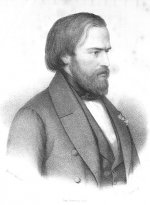 Today is the 200th birthday of Frédéric Ozanam the famed co-founder of the Saint Vincent de Paul Society (may 1833). Born in Milan and lived in various cities in France, Ozanam was a well-educated man earning doctorates in law and letters; we was a literary critic and professor of literature. In June 1841 he married Amélie Soulacroix.
Today is the 200th birthday of Frédéric Ozanam the famed co-founder of the Saint Vincent de Paul Society (may 1833). Born in Milan and lived in various cities in France, Ozanam was a well-educated man earning doctorates in law and letters; we was a literary critic and professor of literature. In June 1841 he married Amélie Soulacroix.
-thumb-400x370-14249.jpg)
